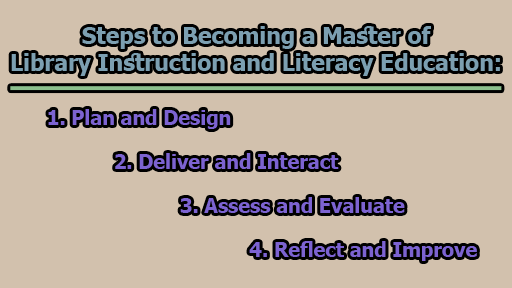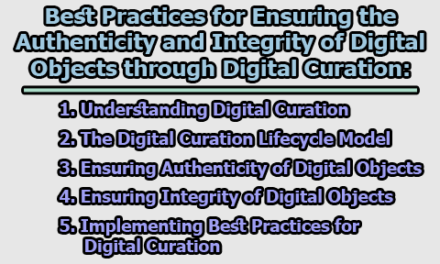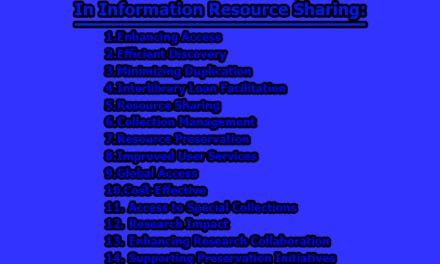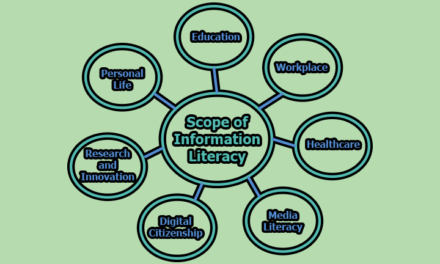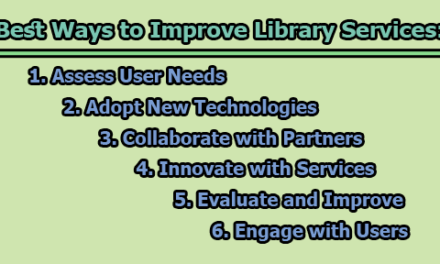Steps to Becoming a Master of Library Instruction and Literacy Education:
Library instruction and literacy education are essential skills for librarians who aim to empower their patrons with the ability to find, evaluate, and effectively use information resources. To become a master in this field, one must follow a well-structured path that includes careful planning, engaging delivery, rigorous assessment, and continuous improvement. In this article, we will explore the steps to becoming a master of library instruction and literacy education.
1. Plan and Design: Before embarking on the journey of library instruction and literacy education, librarians must meticulously plan and design their sessions. This initial step is crucial for ensuring the effectiveness of your instruction. Here’s what you need to consider:
- Learning Outcomes: Begin by defining clear and measurable learning outcomes. What do you want your students to learn or achieve by the end of your instruction? These outcomes should guide your entire planning process.
- Learner Needs: Understand your audience. Consider their characteristics, prior knowledge, and unique needs. Tailor your instruction to address these specific requirements.
- Instructional Methods and Materials: Select appropriate methods and materials that align with your learning outcomes and learner needs. This may involve choosing textbooks, online resources, or designing interactive activities.
- Curriculum and Standards: Ensure that your instruction aligns with the broader curriculum and educational standards. This integration makes your instruction more relevant to students’ academic goals.
- Inclusive Learning Styles: Consider diverse learning styles and preferences. Think about how to accommodate different ways of learning, making your instruction more accessible to a broader audience.
You can utilize frameworks and models like the ACRL Framework for Information Literacy for Higher Education, the ADDIE model, or the backward design approach to help guide your planning process. Moreover, consider the logistics of time, space, and available resources to ensure a smooth execution of your instruction.
2. Deliver and Interact: Once the planning phase is complete, it’s time to execute your library instruction sessions effectively. Here’s how to ensure your delivery engages and interacts with your learners:
- Clear and Concise Language: Use clear and straightforward language. Avoid jargon or overly complex terminology that may confuse your audience.
- Relevant Examples: Provide meaningful examples that relate to the students’ lives or academic pursuits. Real-world relevance can make the instruction more engaging.
- Enthusiasm and Expertise: Show your passion and expertise in the subject matter. Your enthusiasm can be infectious and motivate students to engage more actively.
- Active Learning Strategies: Implement active learning strategies, such as group discussions, collaborative projects, or problem-solving activities. These methods keep learners engaged and involved.
- Technology Integration: Depending on your instructional mode and format, consider using various technologies and tools, such as presentation software, learning management systems, web conferencing platforms, or online tutorials, to enhance the delivery of your content.
3. Assess and Evaluate: The assessment and evaluation phase is essential for measuring the effectiveness and impact of your library instruction. To do this effectively, consider the following:
- Formative and Summative Assessment: Use both formative and summative assessment methods to collect data and evidence of student learning and information literacy. Formative assessments help you monitor progress, while summative assessments measure overall performance.
- Quantitative and Qualitative Methods: Employ both quantitative and qualitative assessment methods to gain a comprehensive understanding of your instruction’s impact. Surveys, quizzes, rubrics, portfolios, and analytics are valuable tools in this process.
- Data Analysis and Interpretation: Analyze and interpret the data and evidence collected. Look for patterns and insights that can inform your instruction and future improvements.
- Report Findings and Recommendations: Use the results of your assessment and evaluation to report and communicate your findings and recommendations to stakeholders such as students, faculty, or administrators. This communication is vital for demonstrating the value of your instruction.
4. Reflect and Improve: Becoming a master of library instruction and literacy education is an ongoing journey. It requires continuous reflection and improvement. Here are some steps to help you on this path:
- Self-Reflection and Peer Feedback: Regularly engage in self-reflection to identify your strengths and weaknesses as an instructor. Seek peer feedback to gain different perspectives and constructive input for improvement.
- Set Goals and Action Plans: Use the insights from self-reflection and peer feedback to set goals and create action plans for improvement. These should be specific, measurable, achievable, relevant, and time-bound (SMART goals).
- Professional Development: Take advantage of professional development opportunities. Attend workshops, webinars, conferences, or courses related to library instruction and literacy education. Join professional associations, networks, or communities of practice to stay informed about the latest trends and best practices.
- Stay Updated: Keep yourself informed about the latest trends, research, and best practices in library instruction and literacy education. Adapt and innovate your instruction accordingly to remain at the forefront of your field.
In conclusion, mastering library instruction and literacy education is a multifaceted process that requires a combination of knowledge, skills, and strategies. By following the steps outlined in this article, you can enhance your role as a librarian and educator, equipping your students with the critical skills they need to navigate the ever-expanding world of information effectively.

Library Lecturer at Nurul Amin Degree College

